St Austell Plasterers: Any time you are doing refurbishments or improvements on your property or business in St Austell it's pretty much certain that you'll either need to get some fresh plaster put onto to a new wall or some affected plaster walls repaired. The fact is that plastering is an extremely skilled craft and whilst you may be fairly useful around the house, it's not really something that you ought to try to do on your own, unless of course you have great confidence in your capabilities. This is even more important if ceilings have to be plastered, since you will almost certainly get yourself and your home in a bit of a state should you try it. You'd definately be wise to call in an expert plasterer to undertake this work, and whilst you shouldn't have any difficulty finding a plasterer in St Austell, securing one that's got a time slot to fit you in might be more challenging. Plasterers, much like a lot of craftsmen, are generally in demand, so if possible try and book someone in a few weeks or months before it needs to be done.
There are not all that many home restoration assignments that do not involve at least a little plastering work. It will normally be work like rendering a bare wall, installing coving or mouldings before decorating, skimming a dry lined partition or latex screeding. Don't imagine however that the above are the only plastering and rendering tasks that might be needed, since there are certainly lot's more possibilities.
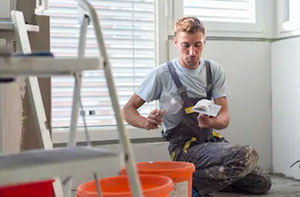
Ask to have a look at some photos of earlier accomplished projects when talking to prospective St Austell plasterers, anybody who knows their trade will be happy to do this, and have nowt to hide. You want to avoid employing "cowboys" for this sort of work, no matter what. You will soon come to realise the many complications that can occur as a result of inferior plastering.
Any imperfections in your newly plastered ceilings and walls will soon show up when a splash of emulsion is brushed onto it. And even more so, with the sunlight shining onto the freshly plastered areas. It should always be possible to locate competent plasterers in St Austell, so why choose a bad one?
It is always good to keep in mind that plaster has to be level and smooth, considering that it's just a base on which other materials and products are placed. Irregular surfaces are difficult to cover up, although little cracks and dents may be easily repaired with filler later without too much trouble. Complications with the painting and wallpapering of walls and ceilings, the accurate fitting or skirting boards, the fitting of kitchen units and any area of wall tiling, can result from a badly plastered area.
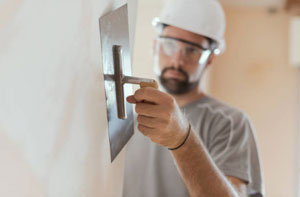
You should anticipate nothing less than a polished finish directly from the trowel. A plastered ceiling or wall should never need to be sanded down to get a nice finish, it should only need a brief rub down with fine sandpaper before it is decorated. If strenuous sanding is required, you can safely assume that your plastering hasn't been done properly. If the use of orbital sanders is becoming commonplace, there is definately something isn't right with your plasterer.
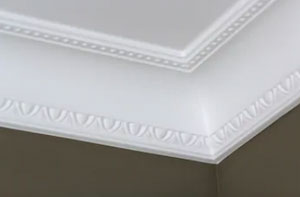
Plasterers perform many tasks but among the most commonplace in recent times, is plastering over old artex ceilings. At the height of its popularity during the nineteen seventies and eighties, artex is out of favour in St Austell properties today. Those dated artex ceilings can be made to look sleek and modern once again by bringing in your St Austell plasterer to cover them up. On the other hand, many plasterers will also apply artex to your ceiling if you have a yen to bring back that 1970's style.
Do-it-Yourself Plastering St Austell: While it is always preferable to use a competent plasterer in St Austell when you have plastering work that needs to be done in your property, it is always possible to have a go at doing it yourself if you're fairly good at DIY, and have the self-belief to try. Practicing on a spare bedroom or an out of sight area is definitely a great idea when you're setting out on your initial plastering adventure. Whenever possible try to choose a wall that already has a poor quality plastered surface, so that your efforts can hardly make it any worse. This will allow you to test out your newly acquired skills and will be much less stressful than taking on a wall surface that everybody in the house will regularly see. To a certain extent, it's quite possible for you to re-skim a wall as many times as you wish, so if you make a hash of it at the first attempt, you can always go back and re-do it as your expertise improves.

If you don't wish to go to the extreme of taking an actual plastering course, you might be able to get some good tips and advice by watching and following YouTube tutorials, although it's not always as simple as the experts make it look in the videos. Plastering is a "hands on" undertaking and the more you practice the more adroit you get. You might even develop some of your own techniques for achieving that perfect plastered finish, then again the tried and proven ways are generally the best. The more you do it the more confident you will get, and all things considered - plastering is all about self-confidence. Once you have mastered the skill to a standard you're happy with, you'll be able to move on to plastering the main walls of your home. You've still got the option of hiring a professional St Austell plasterer to put things right if you mess it up.
What is Plaster?
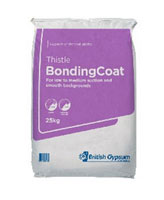
A frequently used building material that's employed for decorating and protecting ceiling and wall surfaces, plaster has been around for hundreds of years. In the United Kingdom the term "plaster" ordinarily pertains to a material which is utilized on the interior of buildings, while the material used on outside surfaces is referred to as "render". Plaster compounds normally contain either cement, lime, or gypsum, all of which work in relatively similar ways. A dry powder at the time of manufacture, as needed plaster is combined with water to produce a stiff but easily workable paste. The blending of the plaster powder and water causes a reaction, and heat is produced by means of crystallization, making the resulting paste go hard.
Polished Plastering St Austell
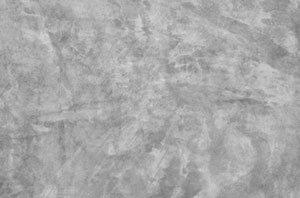
Particularly fashionable right now, polished plaster is a modern day variation of classic Italian plasterered finishes. Describing anything from rugged textured plasters to really highly polished Venetian, Marmorino and Lucidato plasters, the expression "Polished Plaster" in fact describes an array of superior plaster finishes. Used predominantly on inside walls and ceilings, polished plaster is intended to provide a surface finish that looks like polished marble, limestone or travertine. Polished plaster has got natural shade variations providing a feeling of depth whilst still smooth when touched. By the blending of these different types of plaster compounds it is quite possible to develop distinct customized finishes that can be utilized to good effect. By making use of artificial or natural colourants, pleasing tints or colours can be applied to the polished plaster finish. Should you wish to achieve a "marbled" effect in your polished plaster, or completely unique designs or colours which do not exist in nature, the ability to add a tint to Venetian plaster is especially valuable. For more information about polished plaster, visit the Wikipedia "polished plaster" page.
Plaster Skimming
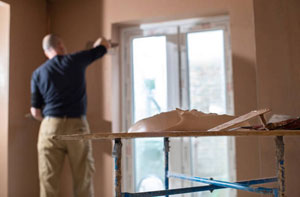
Plaster Skimming St Austell: A thin coating of plaster spread on top of damaged plasterwork, unwanted artex or new plasterboard is called skimming or re-skimming. Plasterers are often asked to do this sort of work. In the course of home renovation projects either existing plastered walls are changed or damaged, or new dry lined walls are put in. A two coat plaster skim carried out by a professional will transform these imperfect surfaces into glass-like, smooth finishes that will be suitable for painting or papering. After a few days of drying, you'll be able to decorate on top of your new plastered area. You should finish up with a wonderfully flat and fault-free surface that will endure for many years.
St Austell Plaster Patching
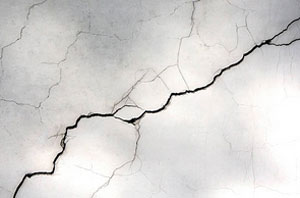
Plaster Patching St Austell: If you live in an older property, or have fairly recently had a bit of construction work done on your house in St Austell, it is fairly possible that you might have cracked or ruined plasterwork that needs replacing or patching. So that it can be properly decorated and kept looking tidy and neat, your plaster ought to be kept in sound condition all the time. Damaged or cracked areas of plasterwork and patches that have been thoughtlessly repaired with Polyfilla, look ugly and spoil the overall appearance your house. So you can complete your decorating and get your plaster walls looking in perfect condition once again, you should hire a professional St Austell plasterer who'll get your walls looking good again in no time. Factors such as vibration, dampness, accidental damage, shrinkage and settlement can lead to issues with plastered walls. Prior to doing any patching or repair work it is essential to address any underlying issues, because damage will probably reoccur if they aren't taken care of beforehand.
Screeders St Austell
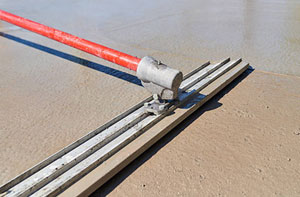
Screeding St Austell: Certain plasterers in Cornwall can also provide a floor screeding service, whereby a smooth, level floor surface is formed using a sand and cement mix. Typically screed is put on top of a concrete sub-floor to be used as a finished hardwearing floor surface, to encase underfloor heating pipes or to be covered with a floor finish (such as carpet, vinyl, tiles or floor boards). Enhanced quality, durability and finish is the result of an effectively laid screed floor. The mixing of screed by hand is only suitable for small areas, otherwise a screed pump should be used to rapidly produce an even, smooth blend of sand, cement and water and to pump this perfect mix directly to where its needed, avoiding the need for paraphernalia like wheelbarrows and such like.
Plasterer St Austell
A plasterer in St Austell is a certified tradesman who exclusively with plaster, carefully spreading a smooth, even layer of plaster over an otherwise rough and irregular surface. As a trade, plastering has been in existence for many many hundreds of years, and as a general construction technique for possibly 1000s. In these modern times, plaster is used to create a smooth, even surface on the interior walls of domestic and commercial buildings. It is also commonly used to form ornamental moldings on the ceiling and other parts of the wall. Playing an essential role in many home remodelling projects in St Austell, plastering will also be used in the the construction of garages, porches, extensions and loft conversions.
Plastering Tasks St Austell

St Austell plastering specialists will likely help with metal studding partitions, monocouche rendering, concrete plaster in St Austell, recessed TV walls, stucco plaster St Austell, pitted plaster, floor levelling, coving and cornices in St Austell, dot and dab plasterboarding, ceramic tiling, pebble dashing repairs in St Austell, false ceilings, magnetic plaster, the rendering of brickwork, float and set plastering St Austell, lath and plaster ceilings, rapid setting screeds St Austell, coloured K Rend, fibrous plaster, fancy coving, lime plastering, skirting board installation in St Austell, screeding floors for tiling, professional plasterers St Austell, floor levelling and screeding, patch plastering, re-skimming plaster ceilings in St Austell, plaster removal, ceiling overboarding in St Austell, dragged plaster and other plastering work in St Austell, Cornwall.
Plastering Information

To follow conversations in relation to screeding, rendering and plastering visit the Plasterer's Forum. Topics comprise Plastering Students Discussions, Magnetic Plastering, General Trade Discussions, Plasterer's Safety, Fibrous Plastering, Floor Screeding, General Rendering, Exterior Wall Insulation, Damp Proofing and Tips and Tricks of the Trade. Find out more about regarding traditional plastering techniques, the history of plaster and plastering, exterior plastering techniques, the tools of the trade, plasterer's tasks and internal plastering, you can visit the Wikipedia "Plasterwork" page. To obtain certified members of the Federation of Plastering and Drywall Contractors you can do a search here. (Tags: Plasterer St Austell, Plastering St Austell, Plasterers St Austell, Plasterers Cornwall).
St Austell Plastering Services
- St Austell Plasterer
- St Austell Plastering Quotes
- St Austell Plaster Skimming
- St Austell Plastering Courses
- St Austell Domestic Plastering
- St Austell Plastering
- St Austell Plasterers
- St Austell Polished Plaster
- St Austell Dry Lining
- St Austell Cornice Installation
- St Austell Stud Partitioning
- St Austell Soundproofing
- St Austell Commercial Plastering
- St Austell Coving Installation
Other Useful Trades in St Austell Cornwall

Naturally, whenever you happen to be doing home improvements and repairs in St Austell, Cornwall, you'll likely be in need of all types of different tradesmen and along with plasterers in St Austell, Cornwall, you could also need dry lining in St Austell, building contactors in St Austell, painters in St Austell, electrical re-wiring in St Austell, pebble dashers in St Austell, screeding in St Austell, polished plaster in St Austell, coving installers in St Austell, external wall insulation in St Austell, cleaners in St Austell, dry liners in St Austell, artexing in St Austell, carpenters & joiners in St Austell, internal rendering in St Austell, bricklaying in St Austell, waste clearance in St Austell, tiling services in St Austell or plaster mouldings in St Austell.
 Plasterers St Austell
Plasterers St Austell Plastering Near Me
Plastering Near Me Plasterer St Austell
Plasterer St AustellPlastering Jobs St Austell: View plastering jobs in St Austell here: St Austell Plastering Jobs
More Cornwall plasterers: Bodmin Plasterers, Hayle Plasterers, St Agnes Plasterers, Saltash Plasterers, Bude Plasterers, Launceston Plasterers, St Blazey Plasterers, Truro Plasterers, Calstock Plasterers, Carn Brea Plasterers, Liskeard Plasterers, Helston Plasterers, Redruth Plasterers, Penryn Plasterers, St Ives Plasterers, Newquay Plasterers, Torpoint Plasterers and Wadebridge Plasterers.
Rendering St Austell - Decorative Plastering St Austell - Polished Plaster St Austell - Plasterer St Austell - Plaster Skimming St Austell - Screeding St Austell - Plasterboarding St Austell - Cheap Plasterer St Austell - Artexing St Austell





